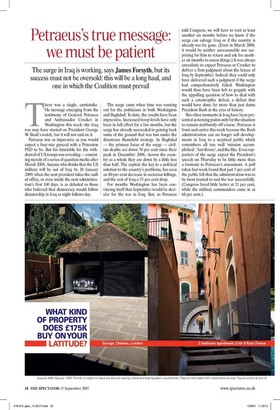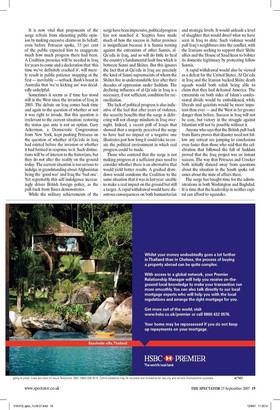Petraeus's true message: we must be patient
The surge in Iraq is working, says James Forsyth, but its success must not be oversold: this will be a long haul, and one in which the Coalition must prevail There was a single, unmistakable message emerging from the testimony of General Petraeus and Ambassador Crocker in Washington this week: the Iraq war may have started on President George W. Bush's watch, but it will not end on it.
Petraeus was as impressive as you would expect a four-star general with a Princeton PhD to be. But his timetable for the withdrawal of US troops was revealing — consisting merely of a series of question marks after March 2008. Anyone who thinks that the US military will be out of Iraq by 20 January 2009, when the next president takes the oath of office, or even inside the next administration's first 100 days, is as deluded as those who believed that democracy would follow dictatorship in Iraq as night follows day.
The surge came when time was running out for the politicians in both Washington and Baghdad. To date, the results have been impressive. Increased troop levels have only been in full effect for a few months, but the surge has already succeeded in gaining back some of the ground that was lost under the disastrous Rumsfeld strategy. In Baghdad — the primary focus of the surge — civilian deaths are down 70 per cent since their peak in December 2006. Across the country as a whole they are down by a little less than half. The capital, the key to a political solution to the country's problems, has seen an 80 per cent decrease in sectarian killings, and the rest of Iraq a 55 per cent drop.
For months Washington has been convincing itself that September would be decisive for the war in Iraq. But, as Petraeus told Congress, we will have to wait at least another six months before we know if the surge can salvage Iraq or if the country is already too far gone. (Even in March 2008, it would be neither unreasonable nor surprising for him to return and ask for another six months to assess things.) It was always unrealistic to expect Petraeus or Crocker to deliver a firm judgment about the future of Iraq by September. Indeed, they could only have delivered such a judgment if the surge had comprehensively failed. Washington would then have been left to grapple with the appalling question of how to deal with such a catastrophic defeat; a defeat that would have done far more than just damn President Bush in the eyes of history.
Too often moments in Iraq have been presented as turning points only for the situation to remain stubbornly off-course. Petraeus is front and centre this week because the Bush administration can no longer sell developments in Iraq to a sceptical public which remembers all too well 'mission accomplished', 'last throes', and the like. Even supporters of the surge expect the President's speech on Thursday to be little more than a footnote to Petraeus's assessment. A poll taken last week found that just 5 per cent of the public felt that the administration was to be most trusted to end the war successfully. (Congress fared little better at 21 per cent, while the military commanders came in at 68 per cent.) It is now vital that proponents of the surge refrain from alienating public opinion by making excessive claims on its behalf; even before Petraeus spoke, 53 per cent of the public expected him to exaggerate much how much progress there had been. A Coalition presence will be needed in Iraq for years to come and a declaration that 'this time we've definitely cracked it', will merely result in public patience snapping at the first — inevitable — setback. Bush's boast in Australia that 'we're kicking ass' was decidedly unhelpful.
Sometimes it seems as if time has stood still in the West since the invasion of Iraq in 2003. The debate on Iraq comes back time and again to the question of whether or not it was right to invade. But this question is irrelevant to the current situation: restoring the status quo ante is not an option. Gary Ackerman, a Democratic Congressman from New York, kept pushing Petraeus on the question of whether al-Qa'eda in Iraq had existed before the invasion or whether it had formed in response to it. Such distinctions will be of interest to the historians, but they do not alter the reality on the ground today. The current situation is too serious to indulge in grandstanding about Afghanistan being the 'good war' and Iraq the 'bad one'. Yet regrettably this self-indulgence increasingly drives British foreign policy, as the pull-back from Basra demonstrates.
While the military achievements of the surge have been impressive, political progress has not matched it. Sceptics have made much of how the success in Anbar province is insignificant because it is Sunnis turning against the extremism of other Sunnis, alQa'eda in Iraq, and so will do little to heal the country's fundamental fault-line which is between Sunni and Shiites. But this ignores the fact that al-Qa'eda in Iraq are precisely the kind of Sunni supremacists of whom the Shiites live in understandable fear after their decades of oppression under Saddam. The declining influence of al-Qa'eda in Iraq is a necessary, if not sufficient, condition for reconciliation.
The lack of political progress is also indicative of the fact that after years of violence, the security benefits that the surge is delivering will not change mindsets in Iraq overnight. Indeed, a recent poll of Iraqis that showed that a majority perceived the surge to have had no impact or a negative one illustrates just how long it could take to create the political environment in which real progress could be made.
Those who contend that the surge is not making progress at a sufficient pace need to consider whether there is an alternative that would yield better results. A gradual drawdown would condemn the Coalition to the same situation that it was in last year: unable to make a real impact on the ground but still a target. A rapid withdrawal would have disastrous consequences on both humanitarian and strategic levels. It would unleash a level of slaughter that would dwarf what we have seen in Iraq to date. Such violence would pull Iraq's neighbours into the conflict, with the Iranians seeking to support their Shiite allies and the House of Saud keen to bolster its domestic legitimacy by protecting fellow Sunnis.
A rapid withdrawal would also be viewed as a defeat for the United States. Al-Qa'eda in Iraq and the Iranian backed Shiite death squads would both relish being able to claim that they had defeated America. The extremists on both sides of Islam's confessional divide would be emboldened, while liberals and quietists would be more impotent than ever — and the West in far greater danger than before. Success in Iraq will not be easy, but victory in the struggle against Islamism will not be possible without it.
Anyone who says that the British pull-back from Basra proves that disaster need not follow any retreat are jumping to conclusions even faster than those who said that the celebration that followed the fall of Saddam proved that the Iraq project was an instant success. The way that Petraeus and Crocker both initially danced away from questions about the situation in the South spoke volumes about the state of affairs there.
The surge has bought time for the administrations in both Washington and Baghdad. It is time that the leadership in neither capital can afford to squander.


























































 Previous page
Previous page